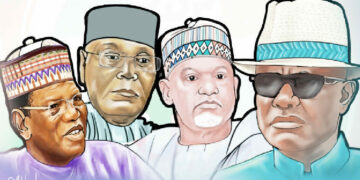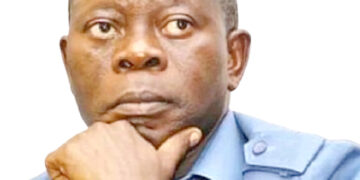Over two decades ago when I was preparing to write Interim Joint Matriculation Board Examination (IJMBE) preparatory to gain admission into the university, something unusual, at least to my reckoning, happened-something I considered to be very queer but which would eventually make sense to me much later in life.
There was this very brilliant senior student of ours in secondary school who, after graduating with first class, was offered a lecturing job in his alma mater. Musa (not real name) taught for less than six months in the university and abandoned his prestigious lecturing job for a private firm in Lagos.
When we met in one of our old students’ meetings at the secondary school, I asked him why he made that infamous decision. He responded by saying he would find time to explain his action to me. By design, we lost contact and since both of us were not regular attendees of the old students’ meeting, he never had the time to explain to me till we ran into each other years after that encounter.
But seeing how well he was faring, I did a quick survey involving a comparison between him and some of my friends who are university lecturers and his reasons for abandoning the prestigious lecturing job in a first-generation university dawned on me.
If Musa had continued with the lecturing job, knowing how intelligent and hard working he is, he would have been a professor long ago. But does it pay to be a professor in Nigeria? What is the worth of a Nigerian professor?
Dying due to hardship
Recently, the Academic Staff Union of Universities (ASUU), the umbrella body of university lecturers, said some of its members died due to poor remuneration that is not commensurate with the biting economic hardship in the land, as well as unfavourable working conditions.
ASUU said about 46 academics lost their lives in universities under the Abuja zone comprising the University of Abuja; Federal University of Technology, Minna; Federal University, Lafia; Nasarawa State University, Keffi and the Ibrahim Babangida University, Lapai.
Tragically, ASUU also said an eminent Professor of Fisheries, Johnson Oyero, of the Federal University of Technology, Minna, died recently due to inability to afford quality medical facilities.
“In the last decade, more Nigerian academics are leaving the country in droves in search of greener pastures, thereby overworking the patriotic ones that remain in the system whose level of patriotism is dwindling on a daily basis due to poor remuneration and working conditions.
“It is also worthy of note that the union has lost several members during the period under review due to herculean working conditions, psychological and emotional stress, and diseases related to these conditions” ASUU’s Salahu Muhammad, said.
Fundamentally, one serious challenge facing Nigerian professors is that of poor pay. In Nigeria, a professor earns an annual salary of between N4,580,349 to N6,020,163 with the lowest monthly salary being N382,000 and N502,000 before tax. This is unjustifiably poor when compared with what politicians, some without certificates, earn on a monthly basis.
Confined to receiving meagre salaries, lecturers in Nigerian universities and other tertiary institutions have remained consistent in reminding relevant authorities that their take home pay cannot take them home.
Mass exodus-cum-manpower shortage
In the midst of this poor pay and very unfavourable working conditions, with little or no incentive to lecture in most public Nigerian universities, the lecturers are leaving in droves. Consequently, these institutions are left with no choice but to grapple with acute shortage of manpower with far reaching implications on teaching and research.
Late last year, ASUU disclosed that close to 500 lecturers left the nation’s universities in search of greener pasture, with most of the universities having vacancies for both teaching and non-teaching staff waiting to be filled.
There is no contesting the fact that this sort of treatment was part of the things that informed Musa’s decision to abandon his lecturing job for the private firm, a decision he took and never looked back. He never regretted it, I am sure.
Only recently, a Nigerian Professor of Law, Joy Ezeilo, lamented her inability to watch the final of the just concluded African Cup of Nations (AFCON) in Abidjan because of the cost of flight ticket. Ezeilo said the N2.1m return air fare to Abidjan is equivalent to her five-month salary.
While lamenting professors’ poor pay, Ezeilo said “This will push the resolve of brilliant young ones we’re training and mentoring to take over from us farther away from the classrooms to becoming political aspirants/election delegates”. Indeed, it has.
The bigger picture
But the derisory manner with which professors specifically and lecturers in the nation’s tertiary education generally are being treated is suggestive of the disdain with which both national and the subnational governments treat education. The federal government for instance, finds it fitting to allocate N110bn to the lawmakers for vehicles and palliatives and earmarked only N50bn for student loan. While the lawmakers have since received their luxurious vehicles, the student loan scheme is yet to take-off. It’s just a matter of priority!
This is a nation where no fewer than twenty million children are out of school in the midst of a staggering N68billion Universal Basic Education Commission (UBEC) unaccessed funds. You asked why these funds which should have been used to improve infrastructure in schools and provide teaching and learning materials have remained unaccessed and the response will be that it is so because states failed to provide matching grants which is a condition to accessing the funds.
To further demonstrate our disdain for education, only recently, the lawmakers rejected a bill that seeks to make university degree or its equivalent the minimum qualification for elections into the governorship, presidential, and other key elective offices in the country. Are these the set of people that will accord deserved attention to the education sector? Certainly not.
It is clear that the disregard for professors and other lecturers in the nation’s tertiary institutions has continued to have a very telling impact on the standard of education with the nation experiencing sustained drop in educational standard and annually producing unemployable graduates.
There is no contesting the fact that the nation is currently facing the consequences of neglecting education. And until radical measures are taken to address current concerns, we may well be witnessing a tip of the iceberg when compared to what lies ahead. Allowing this to persist is akin to the nation sowing the wind. It should be ready to reap the whirlwind. We must always remind ourselves that no nation develops beyond the system of its education.




